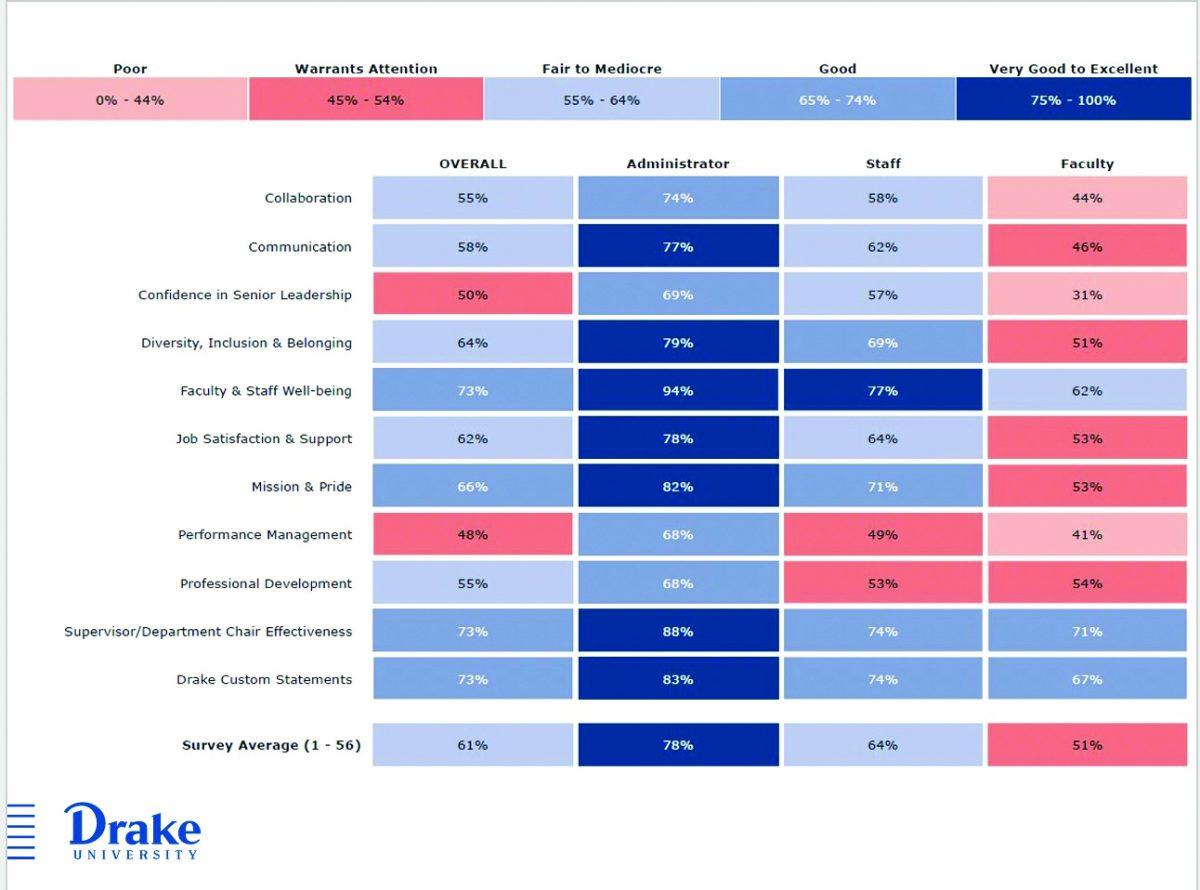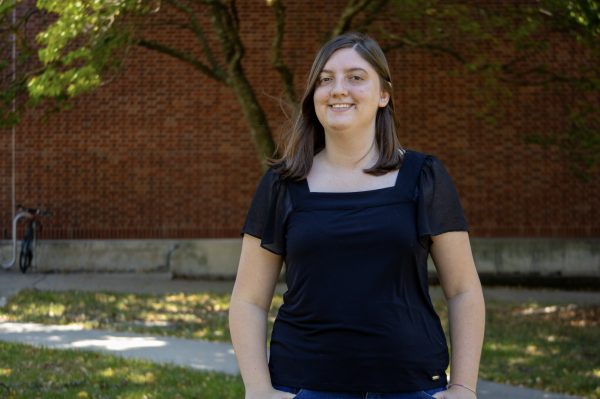Following years of limited communication during the pandemic, this year, the Meredith renovation and planned renovations are testing the communication systems between administration and faculty.
Drake University’s 2022 “Great Places to Work” survey results, which were made public last August, demonstrate a disconnect between faculty and administration. “Senior leadership shows genuine interest in the well-being of faculty, administrators and staff” dropped 16% compared to the previous year. Faculty’s “communication” stands at 46%, while faculty’s “confidence in senior leadership” stands at 31%.
“As you look through the results, you’ll see that overall scores from across multiple benchmarks in higher education have declined from the previous year,” Chief of Staff Nate Reagen and Executive Director of Human Resource Maureen De Armond said in the poll’s OnCampus announcement. “While this does show that there are issues bigger than Drake at hand, it does not preclude us from taking action.”
Faculty Senate, the faculty’s primary governing body, does not have an anonymous place to submit concerns, and all meetings are generally attended by Provost Sue Mattison and President Marty Martin.
“I feel like sometimes we need a way to communicate without being identified,” said Beth Younger, a professor of English.
In the survey, one of the main themes for improvement was “respect for faculty and shared governance.”
At the April 19 Faculty Senate meeting, Mattison highlighted a new Faculty Senate ad hoc committee charged with aligning Drake’s academic charter with guidelines set by the American Association of University Professors. The AAUP guidelines aim to advance shared governance and academic freedom for faculty and are used by universities nationwide. The committee would begin work in the fall since the end of the spring semester is generally a busy time for faculty and administration between ending the year and finals.
“There have been times when there are questions about decision-making authority and input,” Mattison said in an interview with Faculty Senate Beat Writer Andrew Kennard. “I think communication is key so that everyone understands what our academic charter says and what AAUP says and the types of decisions that don’t fall under either one, [and] there can be opportunity to have input in a discussion.”
In the first week of April, faculty in the World Languages and Cultures Department were told that their offices would be staying in Howard after the renovation of Meredith, even though faculty were told throughout the renovation process that they would be returning to their Meredith offices. Some faculty even labeled their boxes with their original room numbers. After backlash, Mattison reversed the decision.
“With finals coming up and papers coming in and projects and supervision, we’re thinking about making it to the end of the semester. Just like students, we’re ready for summer to be here as well,” said Marc Pinheiro-Cadd, a professor in the WLC department. “The added stress is certainly unwelcome. It’s taxing.”
The proposal happened because some offices on the second floor of Meredith will be replaced by student zip spaces similar to those found in Collier-Scripps or the basement of Cowles Library. In the original plans, there were four zip spaces, but recently there was a proposal to raise it to eight, reducing the number of available offices. With WLC staying in Meredith, that number is reduced again to four.
Once informed about the increased amount of zip spaces, Gesine Gerhard, Dean of the College of Arts and Sciences, proposed that the WLC department remains in Howard based on size but also the unique positions of their adjuncts, who she said typically work at Drake longer than other adjuncts. On the current blueprint for the second floor of Meredith, all adjuncts have a shared space. In a meeting with the departments on the second floor of Meredith: history, political science, and WLC departments, Reagen described the space as having 2-3 smaller desks and possibly room dividers.
When the plan was for the WLC department to remain in Howard, there would have been refurnishing in the lower level, according to Mattison.
If WLC had stayed in Howard, that would mean teaching in a separate building from their offices, where faculty keep most necessary materials. The department also has connections to the two other departments historically on Meredith’s second floor.
“We work closely together, [and] we share a lot of students. Our programs need to be aware of each other. We contribute to each other’s programs in all kinds of ways,” said Kieran Williams, a professor in the political science department. “Historically, we’ve always had close working relationships between those three departments, not to the exclusion of everybody else. Historically those three programs have tended to benefit from being co-located.”
General Communication About Meredith
Otherwise, communication about Meredith and the renovation process has varied depending on the time period and department.
According to Gerhard, communication regarding the renovation slowed during the fall, possibly because there wasn’t much to report. She’d expected it to ramp up during the move-in.
“Most people felt the same way, that it’s all about the move back, and then there’s this shortage of rooms,” said Gerhard. It had been a crisis for her to solve. She said she tried to find a positive from the sudden situation.
Dean of the School of Journalism and Mass Communication Catherine Staub said she and other professors in the department have toured Meredith multiple times. According to Inbal Mazar, a professor in the WLC department, there has been the opportunity for her department to schedule tours if professors made an appointment with said department.
Reagen is meeting with each faculty member individually to discuss office location and share information related to the move.
“It’s an opportunity for if there’s any questions or whatnot that each faculty member knows where to go and are on happy levels of communication,” said Reagen.
Department reconfigurations, such as promotions or retirements, have created necessary office configurations on all levels.
“We don’t know what we’re going to use that space [the empty offices in Howard] for,” Mattison said. “There will be a lot of empty offices, so we’ll figure out if there are different faculties that would want to move there depending on their discipline or how they fit with the current faculty.”
Associate Chief Information Technology Officer Jerome Hilscher said technology is decided last. Hilscher works with the Faculty Senate technology subcommittee and department chairs on the technology in Meredith, which he says will be relatively the same.
“Because it was not a build from the ground up, we have not been asked to participate in a lot of the discussions,” Hilscher said. Hilscher mentioned a want to upgrade the technology in some of the corner classrooms, which will likely be requiring upgrades in a few years.
What Does this Mean for Next Year?
During the investigation process for this article, some professors expressed concerns about email surveillance by the administration. One faculty member avoided a request for an interview over Drake’s email server but reached out over personal email due to concerns about surveillance.
“People are petrified to go on the record, and that is not healthy,” said Amahia Mallea, a professor in the history department, about the email concerns.
Drake’s email custodianship guide gives four circumstances in which emails can be accessed.
- In response to a court order or other compulsory legal process.
- In certain other circumstances only with the permission of authorized individuals (an email steward) or the provost.
- When the correspondent is unavailable and the information is necessary to conduct university business.
- In health and safety emergencies.
These clauses are not described in extensive detail, but to access the email, an email steward (Provost, Director, Human Resources, Vice President for Student and Academic Services, Dean of Students, members of the President’s Council, or their designee) would evaluate said need. Some professors requested meetings off-campus based on various concerns, including discussing pay, and most professors preferred to speak only off the record.
Drake’s 2023 “Great Places to Work” survey has a 70% response rate as of the last Faculty Senate meeting, and results will be available in early summer.
Mack Swenson, Lia Reichmann, Andrew Kennard and Maria Heath contributed reporting.








